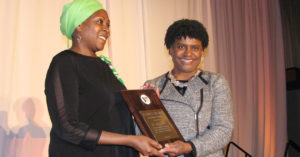By Lincoln DePradine

A Dalhousie University professor says Canada’s political leaders, at all levels of government, ought to offer an apology to African Canadians for slavery and other inhumane acts against Black people.
Dr. Afua Cooper, speaking in Toronto last Sunday, noted that while other groups have received apologies for acts of discrimination and racism, no such gesture has been forthcoming to the Black community in Canada.
“It’s almost like people don’t want to apologize to Black people,’’ said Cooper. “It’s high time that there be an apology; national, provincial, municipal apology to the Black community in this country.’’
Cooper, a professor in the department of History and Sociology and Social Anthropology at Dalhousie University, was the keynote speaker at the “Black History Month Kick-off Brunch’’ at the Metro Toronto Convention Centre.
The theme of the brunch, organized by the Ontario Black History Society (OBHS), was, “Preserving our Past, Igniting our Future’’.
OBHS president Natasha Henry said the theme “calls for us to be responsible to our ancestors who came before us; to our youth today; and to our progeny who will follow’’.
The OBHS, she told the audience, “recognizes and continues to work to preserve Black history.’’
She announced that as part of that effort, Toronto Mayor John Tory will be convening a meeting of organizations and individuals next month to move the “agenda forward’’ on establishing a Black History Museum in Toronto.
“We remain committed to continue working with the City of Toronto to actualize the creation of a Black History Museum in Toronto that will be a legacy to our children and to the city and the province,’’ said Henry.
Among other OBHS initiatives, she said, is ongoing work on the developing and unveiling of an exhibit, “Black History is Canadian History: Continuing the Conversation’’.
Cooper, in her keynote address, pointed out that the event’s venue is on the approximate site where an enslaved African named “Peggy’’ attempted, on numerous occasions, to flee from her slave-owning captors. Peggy, from information gleaned from historical records, was described by the enslavers as a “bad woman’’ and a “mean slave’’, for seeking freedom from slavery.
“This is part of our past; this history of enslavement of Black people,’’ Cooper said.
Cooper, who also is president of the Black Canadian Studies Association, referred to other acts of injustice against Black people. She mentioned, for example, a 1911 Order-in-Council, by the government of then Prime Minister Sir Wilfrid Laurier, to ban Black people from entering Canada.
“We need an apology,’’ Cooper stressed. “Had there not been a concerted effort to keep Black people out of Canada, there would have been more Black people coming to Canada.’’
Cooper said there must be “reconciliation’’, but explained that it would involve “truth-telling’’ which would help “redignify’’ Black people.
“We cannot engage in reconciliation, without speaking the truth,’’ she said.
Cooper also noted that the Royal Ontario Museum (ROM) in Toronto was the target of protest in 1989 when it tried to mount an exhibition, “Into the Heart of Africa’’.
“Many people suffered, people went to prison, people had to leave the city,’’ she said. “Nonetheless, the exhibition was taken down. It was supposed to travel around North America and the museum cancelled it.’’
In 2014, a “very painful conversation about reconciliation began with the Royal Ontario Museum. But we had to tell the story, we had to speak the truth, we had to talk about the pain that so many in the Black community in Toronto and around Canada suffered as a result of the protest,’’ Cooper added. “We began this dialogue, this discourse, with the Royal Ontario Museum, that eventually resulted in an apology in 2016.’’
Cooper was also one of seven award recipients at the OBHS brunch.
Awards were also presented to journalist Ron Fanfair; trade union leader Yolanda McClean; storyteller and activist Sandra Whiting; community activist and founder of the Zero Gun Violence Movement, Louis March; the first Black player in the National Hockey League, Willie O’Ree; and the historic site, Uncle Tom’s Cabin.


